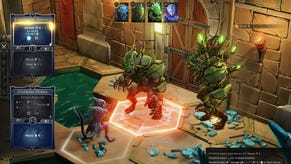Are video games immune to cryptocurrency failure?
46% of 2017 ICOs have already failed, but most games-based projects seem to be ongoing
A new study has shown ventures funded by Initial Coin Offerings are struggling, but research by GamesIndustry.biz suggests video games ICOs are not among them.
ICOs have risen in popularity over the last year as cryptocurrency has been embraced by a wider audience. The process is much the same as an IPO but instead of shares in the company, investors buy tokens that can later be spent on the finished product or service.
Cryptocurrency news site Bitcoin.com reports that 46 per cent of token sales from 2017 have already failed. Using ICO tracker Tokendata.io, the site asserts that out of the 902 sales last year a total of 418 never launched their final product.
142 of these were unable to raise the necessary funding via the ICO itself, while 276 have since disappeared - "either due to taking the money and running, or slowly fading into obscurity," according to Bitcoin.com.
The failure rate increases to 59 per cent when taking into account the 113 ICOs where the company has stopped communicating or the community is too small to give the project any hope of success.
An increasing number of video games companies have been turning to ICOs and token sales in order to raise funding, and GamesIndustry.biz has found the success rate to be considerably higher.
Of the 41 games-related projects we were able to find via Tokendata, only four had failed, suggesting a success rate of 91 per cent.
24 of the games projects we found listed the total raised by the ICO, with six generating over $10 millon. A further five raised over $1 million. Virtual item trading network Wax was the clear leader, having raised $68.4 million, followed by the $53 million raised by mobile gaming platform MobileGo. Gamer reward platform Refereum was the biggest at $30.2 million.
There were a few familiar names among those declaring the amount funded, including Russian games streaming platform Playkey with $10.5 million (which we previously covered), Reality Clash's $2.56 million (oddly, a little lower than the $3.5 million we previously reported), and CCG game Spells of Genesis with $200,000 (which you can read about in our interview here).
One notable absence from Tokendata's listings was troubled German studio Crytek, which launched a cryptocurrency towards the end of 2017. However, a visit to the Crycash website shows the token sale was successfully completed, shifting more than seven million virtual coins. (It's not clear how much real-world money was raised - GamesIndustry.biz has reached out to Crytek for clarification.)
We also found a further 14 games projects on Tokendata that completed their ICOs but have declined to share the total. These ranged from Early Access arena battler Skara and online card game platform Nova Blitz, to various new game development platforms, including Getgame, IZX and Game Com.
Of the titles that completed but did not disclose totals, one appears to have failed: Mainasset, a strategy game built around mining cryptocurrency. Heading over to the game's website, the creators reveal the project has closed due to insufficient investments.
The other three failures in the games space were game development platform Totum, mobile arena game Battle of Titan, and in-game item marketplace Mold - all of which were unable to raise their targeted funds during their ICO.
It is crucial to note that many of these projects are still in development - indeed some of the token sales we found were completed as recently as the last two months - so there is no guarantee that the companies behind them will be able to build on their cryptocurrency's success.
Nonetheless, it appears interest among the cryptocurrency community is high for video game projects, bucking the trend in the wider market for ICOs.








